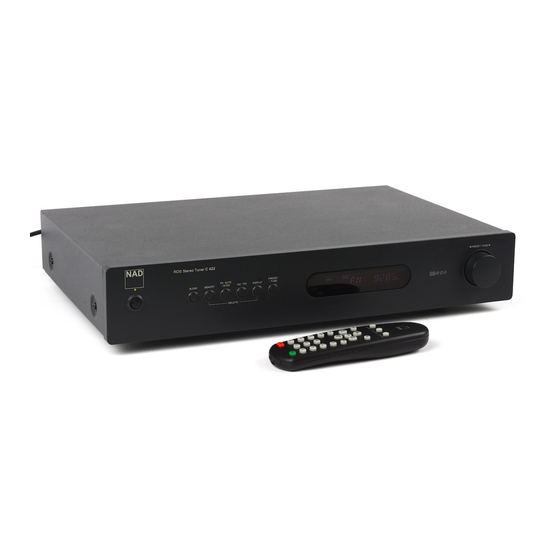Advertisement
Quick Links
C 422 Stereo Tuner
•30 Station random presets (AM or FM)
•30 Station random presets (AM or FM)
• MOS-FET RF Front End
• VFL Display
• 8 Character preset naming capability for AM &
non-RDS stations
• 12V trigger input
• RDS PS (Station name) and RT (Radio text)
• IR Sensor
• IR Input
The NAD Model C 422 boasts a full measure
of NAD performance combined with simple
and intuitive operation. Everything needed
to get the best from today's radio broadcasts
is included without the over-elaboration of
"bells and whistles" so common on competing
products.
Features
With 30 presets available you can store all your
favorite radio stations. These presets can be
any combination of AM and FM stations: 25
presets for FM and 5 for AM, or 17 for FM and
13 for AM, for instance. To avoid having to
scroll through 30 presets, the un-programmed
(empty) ones are skipped to give you quick
access to all your favorite stations.
Instead of littering the front panel with buttons
and features that are hardly ever used, the NAD
Model C 422 concentrates on convenience in
daily operation. The RDS limits itself to the RDS
PS and RT functions, both of which enhance
ease of operation. The RDS PS (Program
Service) will automatically indicate the name
of the radio station you are listening to in the
display, e.g. "BBC R1", so you will always know
exactly what station you are listening to. At
the touch of a button RDS RT (Radio Text) will
display additional information broadcast by
the radio station, such as the presenter, which
music is playing, etc. For AM and non-RDS
stations the C 422 allows you to name each
preset individually with up to 8 characters.
Once you have named your presets you don't
need to remember which frequency goes with
what radio station, the name is indicated in the display every
what radio station, the name is indicated in the display every
time the preset is recalled.
All the preset information is stored in the C 422's non-
volatile memory, which means it will remember all of its
preset information even if the unit has been unplugged
for a prolonged amount of time. Thanks to the front panel
IR sensor and NAD-Link the Model C 422 can be remote
controlled by one of NAD's system remote controls which
come supplied with other NAD equipment, or by one of
the many available universal remote handsets and keypad
systems.
Using the 12V trigger input, the C 422 is easily switched to
On or to Stand-by from remote components. NAD's own
C 160 pre-amp, C 352 and C 372 Integrated Amplifi er sport
12V trigger outputs, for instance. The inclusion of 12V
triggers makes the C 422 an ideal choice for demanding,
high quality Custom Install applications.
Apart from its ease-of-use, the NAD Model C 422 also
offers features to get the maximum out of the airwaves.
Auto Search automatically stops at the next strong radio
signal it comes across and optimizes tuning. Weaker radio
stations can be tuned into manually. The MOS-FET RF
Front End design together with high quality components
and careful PCB layout guarantees excellent sensitivity
with low intermodulation distortion to provide noise free
reception. Although AM can never reach the quality of any
FM transmission, the Model C 422's AM section retains
excellent clarity together with lowest possible background
noise.
Whether you are looking for excellent performance, ease of
use or the convenience of RDS, the Model C 422 offers all
these with the low price / high performance ratio that NAD
is so renowned for.
Advertisement

Summary of Contents for NAD C422
- Page 1 Thanks to the front panel IR sensor and NAD-Link the Model C 422 can be remote controlled by one of NAD’s system remote controls which...
- Page 2 Shipping Weight NAD Electronics International reserves the right to change specifi cations or features without notice. NAD is a registered trademark of NAD Electronics International. All rights reserved. No part of this publication may be reproduced, stored, or transmitted in any form whatsoever without the written permission of NAD Electronics International.















